- History of Franchising
- When Did Franchising Start?
- What is Franchising?
- What are franchising product ?
- How does a franchising strategy work?
- How does the franchisor make money?
- How does the franchisee make money?
- Types of Franchise Models:
- Advantages of Franchising Business for franchisor:
- Advantages of franchising for a franchisee.
- Franchisor’s Support:
- Conclusion:
Are you afraid of failing in your business? Consider Franchising. Entrepreneurs who want to open a Franchise seek franchising as a viable option for them. On the other hand, if you are a brand that seeks to franchise your business and grow their firms in today’s world. Read more to know –What Is Franchising
The myth says opening a franchise costs millions of dollars in both money and paperwork. But, anyone can create a franchise for less than that. I firmly support franchising because of my experience working with several franchisors and franchisees.
Working together to create something far larger than we could have done on our own is the power of franchising. The beauty of franchising is that you may have franchise partners worldwide working together to establish a strong brand.
Did you know that franchising is one of the least time-consuming business models?
Approximately 80% of franchisees are profitable. Because starting a business on your own might be risky. Why not consider franchising as part of your personal and professional business expansion plan?

Learning Terms
What is a Franchise?
A franchise is an arrangement or relationship. The company allows an individual or another company to sell or distribute its goods or services in a specific area or region.
Who is a Franchisor?
The meaning of franchisor is a corporation or organisation that provides franchisees, also known as Brand, in retail perspectives. Also known as a franchise selling company.
Who is a Franchisee?
A franchisee is a person who has been granted a franchise license. Also known as franchisee owner, the franchisee is the owner of the franchise business.
I’ll explain everything in this article based on my experience with franchising. Use my experience to franchise your company or buy a franchise to boost your family’s income.
History of Franchising
The idea of franchising began in the mid of nineteenth century. Local administrations would grant licenses to wealthy landowners to keep order in a city.
Those who opened new businesses had to pay taxes to these sponsors. The early franchisees had to pay the government a fee to protect angry citizens. The European Common Law adopted these regulations.
The business model is still widely used today. But how did franchises start?
Franchises first gained traction in the mid-and large-scale business models. In the late nineteenth century, the concept of franchising was made popular by television and the national highway system.
Thus, property owners establish recognizable brand names, creating a competitive advantage for national chains.
After World War II, the idea of franchising was embraced by a variety of industries, including retail. The growth of franchising continued until the 1950s.
When Did Franchising Start?
The franchising practice began to spread throughout the industrial sector and spread to the soft drink bottling industry and gasoline. By 1950, more than 100 companies had started franchising.
The post-World War II economy had given rise to the modern form of franchising. With the expanding interstate highway system, the suburbs, and the automobile population, the American public was more mobile than ever before.
As a result, the demand for franchised products grew exponentially.
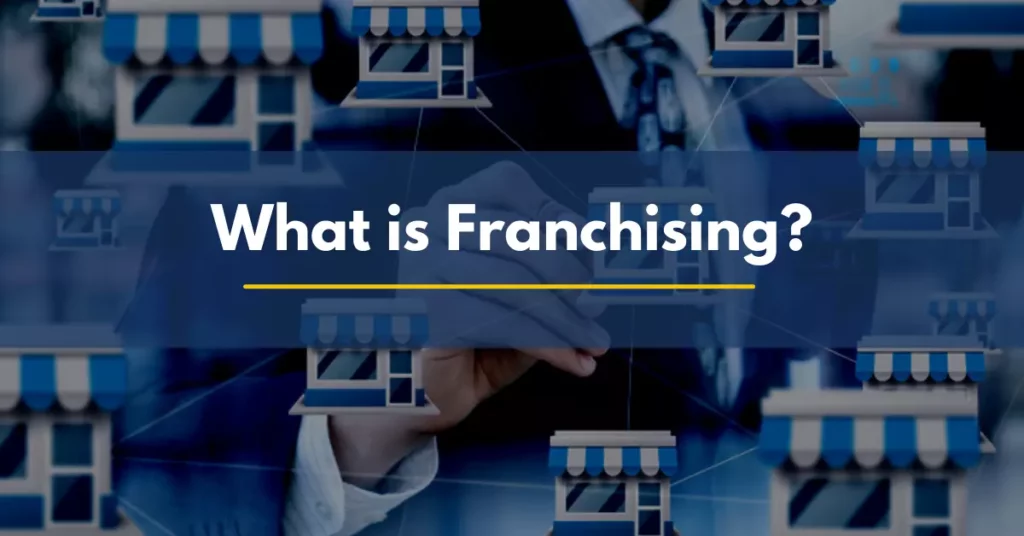
What is Franchising?
Franchising is typically done by a business model in which a company, known as the franchisor expands the reach of an established concept through a network of franchisees.
The proven business prototype and concept, product, and systems must all be scalable and teachable to new franchisees. It’s likely that if it’s a successful brand, it’s been franchised.
Anyone can be a franchisor or franchisee, according to my personal experience. To become a franchisor, you’ll need a few standard processes, policies, and a successful business prototype.
The franchising business model has been around for a long time and has proven successful in growing a company locally and globally.
I will undoubtedly assist you in your quest to become a successful franchisor. I will also provide numerous recommendations for existing franchisors to help them achieve new heights with franchise development.
What are franchising product ?
Fast food, restaurants, gas stations, supermarkets, beauty salons, tyre experts, service centers, and the list goes on, and franchising marketing continues to increase year after year, which is fantastic news for franchisors, franchisees, and potential franchisees.
We decided to share our experiences in this blog Franchise Deck after working in the franchise market for over 15 years.
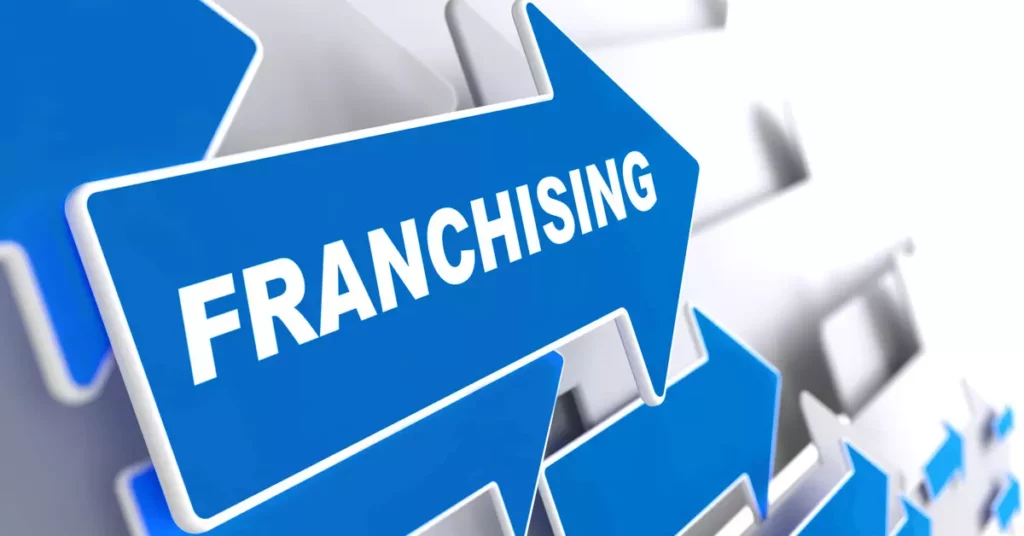
How does a franchising strategy work?
Many people have excellent business, product, quality, and service. However, becoming a franchisor can help you expand your business.
In the Franchise business, the franchisor gives the franchisee access to the company’s exclusive tools, technology, software, trademarks, signage, business processes, business know-how, and standard operations manuals. It is critical to address them.
Franchising has exploded in popularity across various industries. The industries include automotive, retail, pharmaceuticals, health & wellness, children’s clothing, food & beverages, education, and more.
My Personal Experience:
By business standardization, which comprised her menu, product offering, and marketing mix, a home baker decided to franchise and successfully open hundreds of bakery stores around the country.
The home baker created more than 100 franchise businesses using simple franchising concepts, which I’ll walk you through.
Now the question arises,
How does the franchisor make money?
With Franchising, you can expand your firm at any time at the pace you want. When the franchisor hands over his franchise to the franchisee, he receives money, profit, or royalty from the business he operates at his location.
The franchisor invests less and profits more at the franchisee’s expense and with the franchisee’s investment. The franchisor is expanding at a faster rate than the industry average.
I recommend Franchising to both franchisors with subject expertise and franchisees adept at managing day-to-day business operations.
How does the franchisee make money?
Franchising means getting to the people where they are capturing new markets in a competitive environment with less risk for brands and franchisors.
It means not starting a business by themselves for franchisees, which comes with high risk.
An established brand has a profitable franchise prototype, loyal following, consistency and quality, and access to preferred suppliers, lowering costs and increasing profitability.
Franchisees get start-up assistance, training and the rights to trade under a brand name; this all forms part of the initial setup costs for the store. They also benefit from the ongoing support, brand and product development and marketing initiatives due to paying monthly royalty and market fees, but success is not just about a brand.
Franchising ensures franchisees’ success since there is no trial and error involved; instead, they use a tried and tested business strategy followed by a standardized and scalable franchise business model.
Types of Franchise Models:
There are numerous types of franchising models. People who aren’t aware of this are missing out on the best franchise opportunities available.
Many individuals are unaware that not all franchise models are created equal. As a result, we will attempt to comprehend each franchise concept in this article.
The following are established franchising models that franchisors are currently using in their operations.
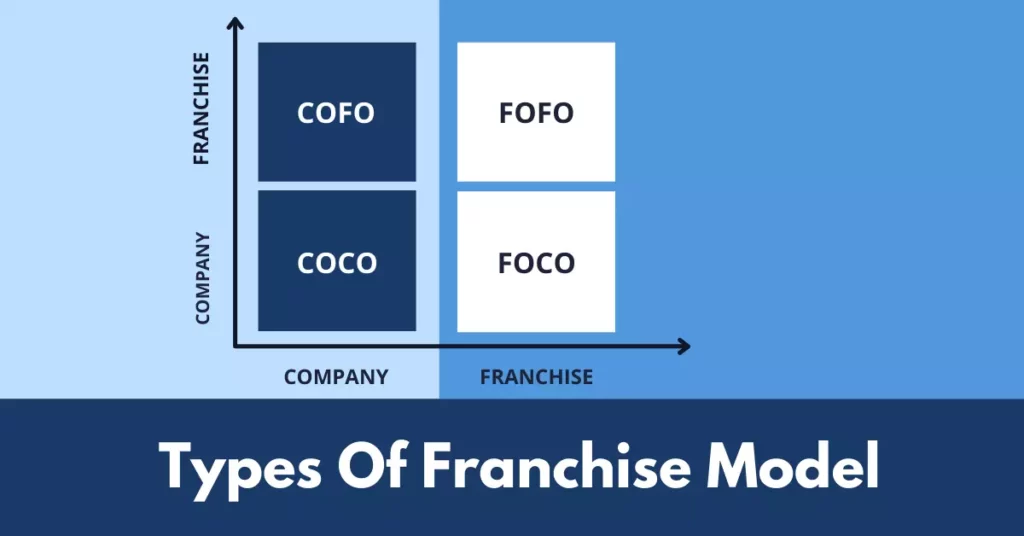
COCO MODEL:
The COCO model involves a business both owned and run by the company, and it means that the company owns the business and that the people who run it are also company employees.
The corporation is responsible for the COCO model’s capital and operational expenditures.
My overview:
COCO is used by a corporation with a lot of money or doesn’t want to share its business knowledge with others.
Few businesses begin with the COCO model and then transfer these units to franchisees in one of the following franchise formats, known as the BOT Franchise business model.
FOCO MODEL:
A franchisee-owned and company-operated firm is part of the FOCO concept. The franchisee is responsible for capital expenditures, while the firm is responsible for operational costs.
This model is preferred when a franchisor uses their specific expertise or skills.
My overview:
The FOCO model is often adopted when a corporation needs finances to expand its business but is hesitant to outsource business operations to franchisees due to tiresome procedures or secret business know-how.
After a threshold period, which could be a training period or the franchisor developing trust in the franchisee’s ability to handle the firm independently, a few franchisors convert FOCO to the FOFO model.
The above-mentioned is a common technique in Franchising and is advised for firms with complicated business functions, such as restaurants, hair salons, and educational institutions.
An example is the Orange Theory franchise, which allows the Absentee franchise or FOCO model.
FOFO MODEL:
The FOFO model incorporates a franchisee-owned and franchise-operated enterprise. In the FOFO model, the franchisor gives the franchisee his trademark, brand, detail, manual, process, and standardization in exchange for a royalty.
The FOFO model can be successful because the franchisor bears less obligation. Expansion is simpler and faster with the FOFO model, but comes with risks such as dependence is more on the franchisee to operate the business.
If the franchisee does not follow all of the requirements, the franchisor cannot monitor the franchisee, and both franchisor and franchisee will suffer.
My overview:
My overall impression is that the FOFO model is a popular franchise model, with users more than 70% of the time. When a franchisor wants to expand quickly and has a standard operations manual and policy, they should choose this model.
Example
5. Pillar to Post Franchise Opportunity
6. Great Clips Hair Salon Franchise
COFO Model:
The COFO model incorporates a franchisor-owned and franchise-operated business.
In this scenario, a firm invests in a franchise, and the franchisee runs it according to the brand’s guidelines. The profit margins might be somewhere between the FOCO and FOFO models.
It is unusual and uncommon in the market because most businesses that expand their operations do so independently.
My Overview:
When a corporation has the cash to expand but cannot manage business operations due to difficult geographies or business complexities, the COFO model is applied.
This concept has been used by franchisors with more than 1000 franchise units that desire to grow further into remote areas where managing franchise operations will be tough.
I will propose this strategy to franchisors who want to deeply enter existing markets and expand into new areas using FOFO models rather than the COFO model.
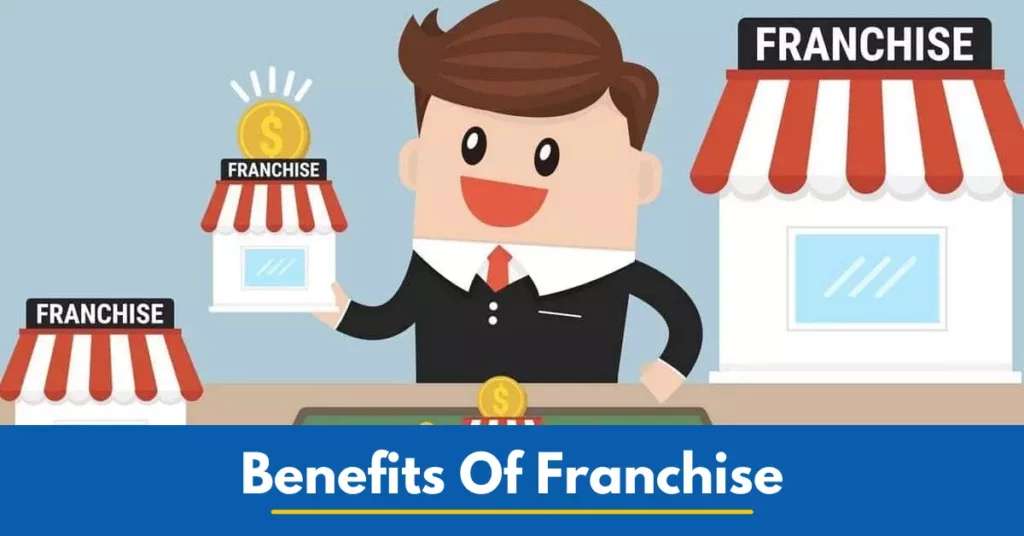
Advantages of Franchising Business for franchisor:
In the process of Franchising, the following are the benefits of the franchisor :
Running costs
The franchisor is not responsible for the day-to-day expenses of the franchise. The franchisee also pays for additional personnel or premises, lowering the franchisor’s operating costs.
Recurring Revenue
In exchange for a franchise, the franchisee pays a royalty to the franchisor, and that royalty is the franchisor’s income.
The franchisor receives recurring revenue when a franchisee pays a royalty every month or year.
Franchising in international business
When franchisor and franchisee agree to carry on business together, and the franchisee is from the international market, it gives franchisor entry into foreign markets. It has the potential to expand globally be vocal by thinking global.
Less investment
Investment for expansion of business involves a lot of money. While conducting franchise business, the franchisee agrees to continue the same company in a different branch, at a different location, resulting in less investment on the part of the franchisor and leading to business expansion.
Control over franchisees
Because the franchisee cannot set business rules and regulations on his own, the franchisor will control the individual who has obtained business rights, i.e., the franchisee.
The franchisee should abide by the franchisor’s guidelines surrounding his franchises.
Increase in goodwill:
The more the firm grows, the more the franchisor’s goodwill grows, resulting in increased sales and higher profits for the franchisor. Goodwill boosted customers and investors in the firm, which is beneficial to both the franchisor and the franchisee.
Advantages of franchising for a franchisee.
In the process of Franchising, the following are the benefits of the franchisee :
Franchisor’s Support:
When a franchisor transfers control of his firm to a franchisee, he will provide all of his support and guidance to help the franchisee run the business efficiently, resulting in less stress on the franchisee’s part.
They might be given the brand, the equipment, the supplies, and the marketing strategy—basically everything they need to run the business.
Less initial investment:
The franchisee has to pay money to obtain the rights to the business at first, resulting in a lower risk of investment on his behalf. After that, the franchisor takes care of setup, ensuring a successful business franchise.
Goodwill from Franchisor:
It takes years to build a brand image, but when a franchisee buys a franchise, the franchisor’s goodwill is passed on to him, allowing the franchisee to go into business immediately.
People will automatically know your business, what you offer, and what they can anticipate when you start a franchise with this identifiable logo.
Minimum chance of failure:
Franchise is largely taken from popular companies or brands that already have a solid reputation, resulting in a lower risk of business failure.
In addition, because franchises have already established their business model, you may be confident that the items or services you’ll be delivering will be in demand.
Franchise loans:
Due to the documentation of a brand’s performance, banks are more inclined to lend, allowing a franchisee to obtain loans through his franchised brand name easily. As a result, the franchisee might use loans to improve their business.
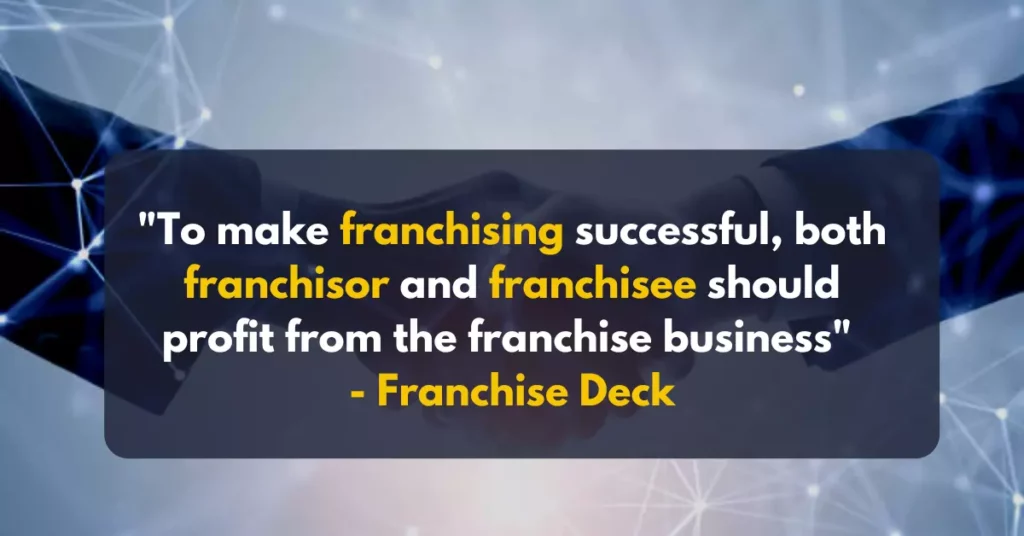
Conclusion:
The franchisor-franchisee relationship functions best when both parties make money and follow their state’s or country’s franchise laws and policies.
I always have and will continue to advocate for ethical business practices in the franchise industry to help the industry thrive and provide profits for stakeholders while also providing jobs for states to tax.
We recommend that the new franchisor have a lean franchise business model to make you franchise-ready. If you’re prepared to expand your company, now is the moment to do so.
Grow your business into a big network of like-minded people who will work hard every day to improve life for their families and the environment with the help of the facts mentioned above and your experience.
So, do you think Franchising is a viable choice for expanding your business? What are the other ways to grow your business?
If you have any insights on how to build your business through Franchising, please share them in the comments section below; we’d love to hear from you.
Also, share what is franchising with others! I’m excited to learn from you as well.

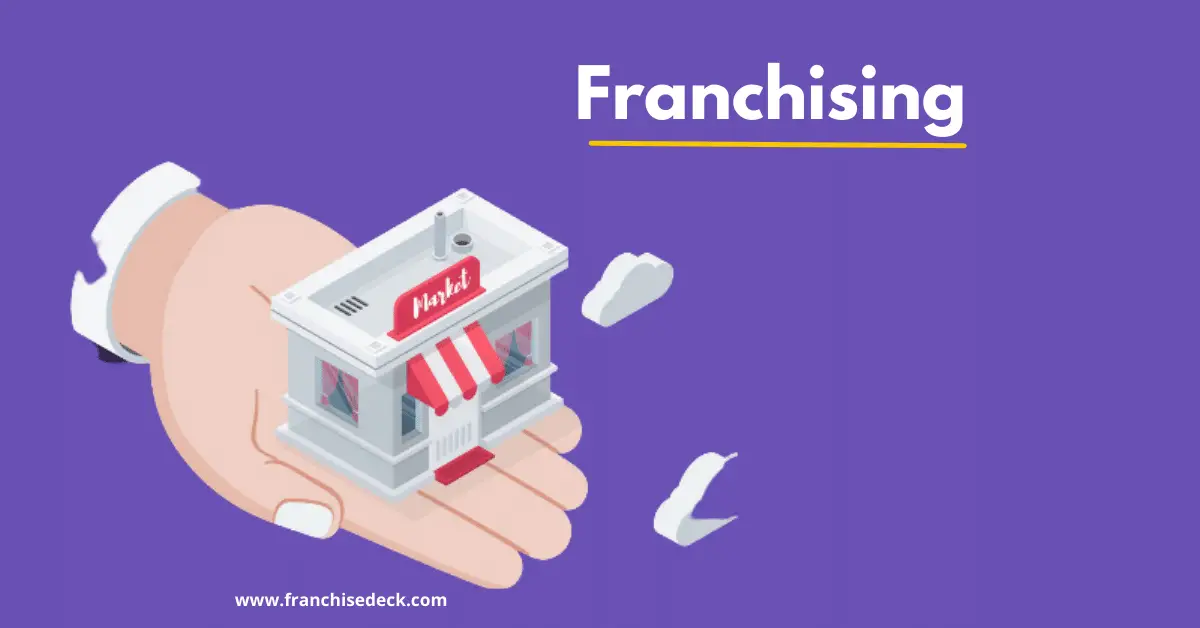
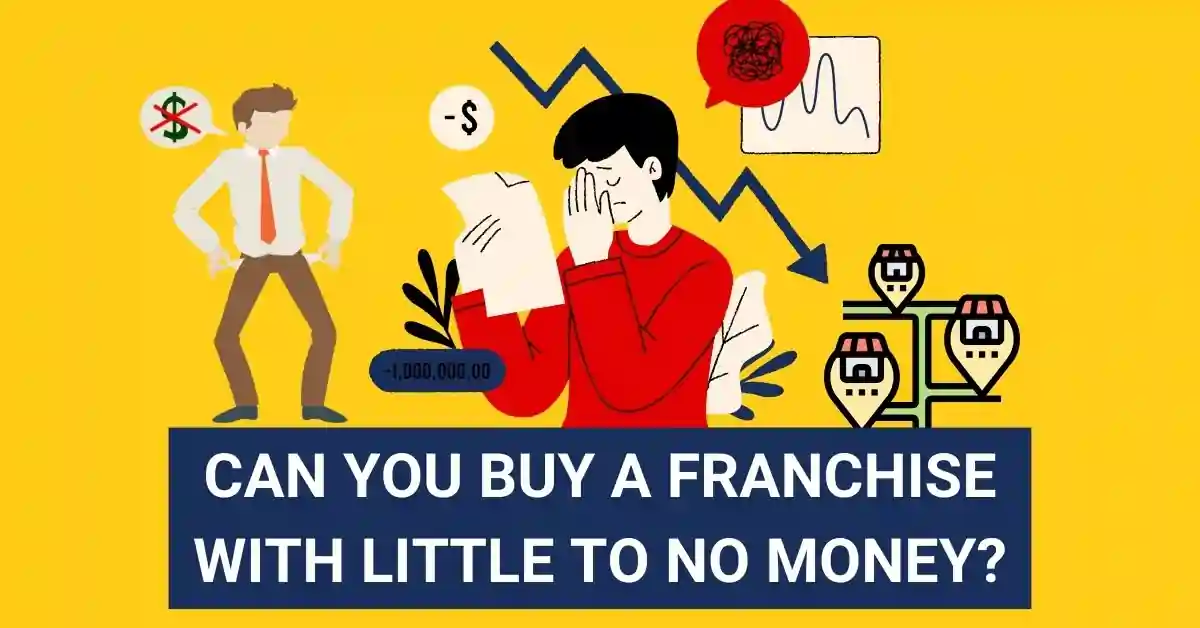



In a nutshell, Franchising is based on a marketing concept that can be adopted by an organization as a strategy for business expansion. It was an amaing article provided by franchisedeck.
Hey buddy,
What is franchising.
You are share good information related franchising I love it.
Hiii
I love to read your informative information related to franchising.
Franchising is a business model in which a company, the franchisor, allows a third party, the franchisee, to use its trademarks, business model, and intellectual property to sell goods or services.
Franchising is often used by businesses as a way to expand their reach into new markets without having to invest in a full-scale operation of their own.
Franchising is a business model in which an individual or company (the franchisor) grants rights to another individual or company (the franchisee) to use its trademark, trade name and business system.
Franchising is an attractive option for those looking to start a business, as it provides a proven business model, an established brand name and a network of resources.
Franchisees benefit from the franchisor’s expertise, resources and support in areas such as marketing, finance, and operations.
The franchisor is responsible for providing training, marketing materials, and other support to the franchisee.
Franchisees pay an upfront fee and ongoing royalty payments to the franchisor for the ability to use the franchisor’s brand, products, and services.
Franchising is a popular form of business ownership, with more than 825,000 franchises operating in the United States. Franchising has been a popular business model for many years, as it allows entrepreneurs to become business owners without the risk of starting a business from scratch. Franchising allows entrepreneurs to start and run their own businesses with the support and guidance of an established franchisor.
Franchising offers a cost-effective way to expand a business quickly and efficiently, as it requires a smaller investment than starting an independent business.
Franchising provides franchisees with the opportunity to own their own business while having the support of an established brand.
Franchising enables the franchisor to increase its market reach and rapidly expand its customer base.
Franchising is a great option for those looking to become business owners, as it provides a lower risk and cost than starting an independent business.
Franchising offers a unique way to collaborate with other business owners and build a strong network.
Franchising provides entrepreneurs with the opportunity to invest in a business with an established brand and a proven business model.
Franchising is a great option for those looking for a more flexible and affordable way to start and grow a business.